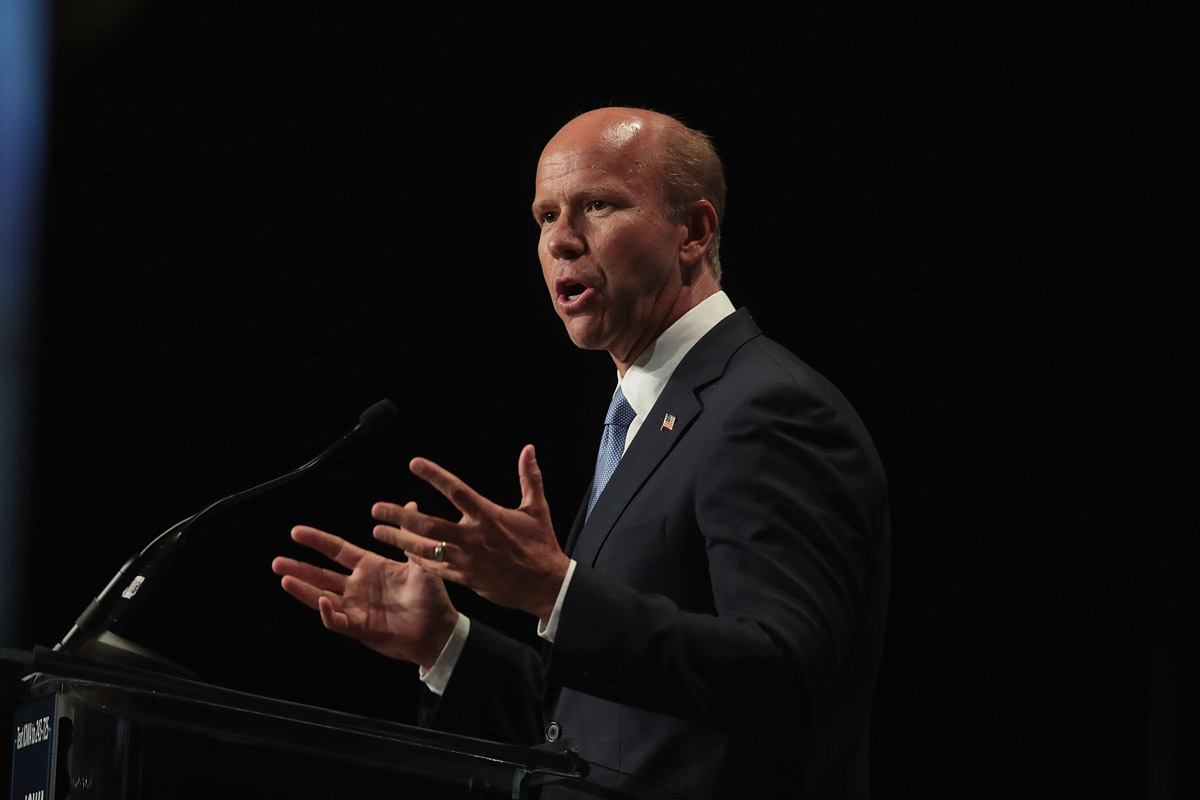There’s a Reason You’ve Never Heard of John Delaney
John Delaney’s campaign for president has lasted two years, cost millions of dollars, and yielded poll numbers as close to zero as you can get. That’s the good news.

John Delaney speaks at the Iowa Democratic Party's Hall of Fame dinner on June 9, 2019 in Cedar Rapids, Iowa. (Scott Olson / Getty Images)
If you informed a room full of family members or coworkers that John Delaney was rumored to be exiting America’s presidential race in the coming weeks, even the more politically engaged among them would likely greet the news with a slightly bemused stare. After a brief pause and some head-scratching, there’s a good chance someone would venture to pose the most obvious follow-up question: “Uh . . . who is that?”
The irony is that the former three-term Maryland congressman has actually been running for president longer than any other Democrat. Delaney declared nearly two years ago — a veritable eternity in politics, particularly during the Trump era — and has spent a far from negligible sum of money inflicting the same tedious, prosaic message on anyone who wants (or is forced by cable TV) to listen. He’s held countless events and given innumerable speeches. He’s visited all ninety-nine of Iowa’s counties and by the spring of 2018 had already spent over a million dollars there: his basic pitch being that Democrats need to offer realistic rather than utopian solutions to the problems faced by Americans, start championing a politics that “gets things done,” and stop making a villain out of banks when the real enemy is partisanship (Delaney is incidentally a former banker who, at a net worth of $90 million, ranked among the House’s richest members).
In practice, this has meant expending tremendous amounts of energy explaining why enormously popular policies favored by large sections of the electorate are actually inadvisable, to a resoundingly uninterested and sometimes hostile public. Delaney explicitly rejects the idea of a Green New Deal and, while plenty of Democratic contenders have waffled around the issue of Medicare for All, he’s been consistent in declaring it bad policy. (To date, one of his biggest and only real media hits remains getting booed by delegates at a Democratic convention in California for bluntly denouncing single-payer.)
All of this is consistent with Delaney’s tenure in Congress, during which he supported fast-tracking the unpopular Trans-Pacific Partnership, sponsored a bill aimed at creating a commission to “reform” social security, and championed another allowing companies to repatriate overseas money by offering them the carrot of a lower tax rate — a textbook example of the kind of toothless measure that tends to find support in both parties under the inane auspices of “getting things done” while wages stagnate, rents soar, and the planet burns to a cinder. Fittingly enough, Delaney’s campaign launch video even featured former Republican Congressman Richard Hanna and went all in on the candidate’s own paint-by-numbers, bootstraps personal narrative.
The richer irony here is that the former congressman’s centrist bluster rests on an underlying premise that there is a sizable constituency in the political market for what his campaign is selling: a vast, unheard mass of primary and general election voters who crave a self-consciously unambitious policy agenda coupled with the same empty platitudes about growing the middle class that Beltway politicians have been spewing for decades. In a field where most Democrats at least understand the need to shift their rhetoric in a progressive direction, a spluttering Delaney has been left to contend that he and only he has the courage to resist ideas that might actually be popular in a general election.
Once upon a time, Delaney’s pitch might have met with more success — if only thanks to a demoralized electorate so accustomed to the drab equilibrium of American politics that a friendly businessman in a suit might have seemed like a perfectly valid option. To say it’s been a failure, however, would be something of an understatement: despite millions spent and almost two years of stump speeches, Delaney has polled as close to zero as is possible for anyone with a pulse since he announced. His social media engagements are embarrassingly low for someone running for president, save the odd tweet denouncing “class warfare,” Bernie Sanders, or Medicare for All that’s been hastily ratio’d into the ground. And after more than 700 days of advertising and campaigning, the candidate’s official YouTube channel has amassed a mere 450 subscribers — with thrilling clips like “John’s Speech at the Progress Iowa Corn Feed” garnering less than a hundred views.
While the Democratic center may yet devise a countermeasure to the populist energy that has largely shaped its presidential primary campaign thus far, the abject failure of Delaney’s campaign to gain even a single iota of momentum should be taken as an encouraging sign. A former three-term congressman from Maryland with a relatively sparse legislative record and no national name recognition wasn’t going to be president in any era, but there was a time when money, advertising, and a handful of generic pro-business policy positions might at least help a candidate buy their way to Iowa. Delaney’s instantly forgettable, quixotic quest for the Democratic nomination is therefore instructive, if only because of what it says about the limits of a well-financed campaign positioning itself as the sensible antidote to progressive profligacy in 2019.
In its own small way, its failure also tells us something about where the momentum really lies.